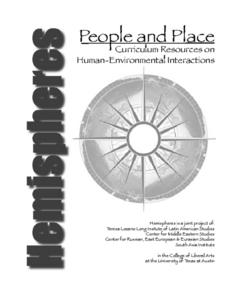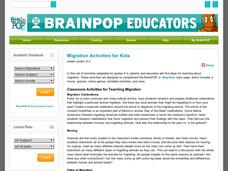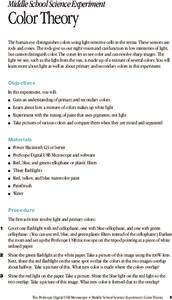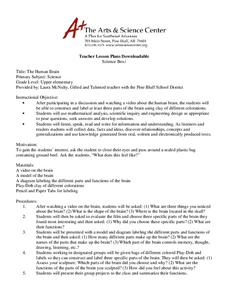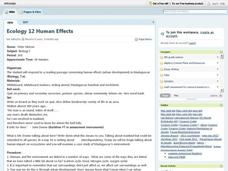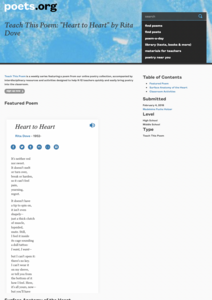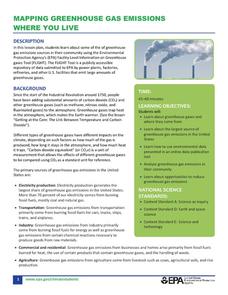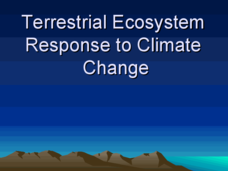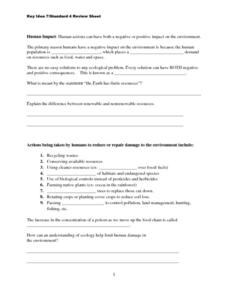Curated OER
Human Body Series - Bones, Muscles, and Joints - Mr. Bones Puzzle
Mr. Bone-jangles has lost a few parts! Primaries can help put him back together by cutting them out from one sheet and gluing them to the correct position on his skeleton. The publisher has written a lesson plan for this activity, a...
Curated OER
Big Dam Construction in India
This complete and full resource includes everything needed to conduct a lesson on the environmental impact of large dams in India. Background information, handouts, answer keys, and web links are all there to help you educate your class...
Alabama Learning Exchange
Systems of the Human Body
Young scholars research systems of the human body. In this biology activity, students read the book Yucky Story and identify the systems of the human body. Young scholars create a Powerpoint presentation to demonstrate their knowledge of...
BrainPOP
Migration Activities for Kids
For as long as there has been life on earth, animals, including humans, have used migration as a means of survival. This collection of activities supports young scientists as they learn about this behavioral adaptation, encouraging them...
Curated OER
Color Theory
Students are able to gain an understanding of primary and secondary colors. They are able to explore about how a mixture of colors makes up white light. Students are able to experiment with the mixing of paint that uses pigments, not...
Curated OER
AP: Chapter 54: Ecosystems
A lot of learning is packed into these 23 questions about ecosystems. Advanced biology classes apply their knowledge of communities, productivity, biogeochemical cycles, and human impact on the environment by writing short answers for...
Curated OER
The Human Brain
Students identify parts of the human brain. In this biology lesson, students watch a video about the human brain. Students use different colors of clay to construct and label the three parts of the brain.
Cold Spring Harbor Laboratory
Mendelian Laws Apply to Human Beings
Why are so many inherited diseases more prevalent in populations of specified races? Scholars learn about pedigrees and genetics using a reading, an animation, primary sourced letters, a short video, a biography, a guided practice...
Curated OER
Human Genes
In this science worksheet, students read 10 statements and 1 question about human genes. Students complete the statements and question by filling in the correct word from a list of 11 words.
Curated OER
Ecology 12 Human Effects
Young scholars are able to respond to a reading passage concerning human effects (under development) in Madagascar. They have a quiz on primary and secondary succesion as their bell ringer. Students write an essay on the topic "No man...
Curated OER
Human Genetics-- Class Tally: Do You Have a Hitchhiker's Thumb?
In this science worksheet, students study diversity in human genetics by participating in a class survey and generating a tally graph. Students are asked if they have a "hitchhiker's thumb" and the results are displayed on the tally...
Clean Up Australia
Why are Batteries Harmful to the Environment?
Open this lesson by reading together about primary and secondary batteries (such as nickel-cadmium cells), problems they can cause in the environment, and how humans can minimize the damage. Afterward, little ones examine a collection of...
Academy of American Poets
Teach This Poem: "Heart to Heart" by Rita Dove
Take heart! Here's a lesson that will encourage learners to notice details. After listening to Sarah Vaughan singing "My Funny Valentine" and noting how the word heart relates to Valentine's Day, scholars observe a human heart image....
US Environmental Protection Agency
Mapping Greenhouse Gas Emissions Where You Live
After investigating the US Environmental Protection Agency's climate change website, your environmental studies learners discuss greenhouse gas emissions. They use an online interactive tool to look at data from power production...
Curated OER
The Chesapeake Bay in Captain John Smith's Time
When Captain John Smith visited the Chesapeake Bay in the summer of 1608, what types of animals and habitats did he encounter? Your young historians will analyze primary source documents to answer this question, as well as compare...
Curated OER
Terrestrial Ecosystem Response to Climate Change
An extensive investigation of the Earth's climate changes awaits your environmental science classes. This top-notch presentation begins by looking at the history of Earth's climate and then predicts the impact on each major terrestrial...
Curated OER
Human Genetics Word Find
In this science worksheet, learners analyze 12 vocabulary words pertaining to human genetics and locate them in the word search puzzle.
Curated OER
The Real Eve
Students research about human migration during a specific time period. In this physical science instructional activity, students watch a video about human evolution. They prepare a presentation on human migration and share it with the...
Curated OER
The Human Body Systems - Lesson Plan
Learners identify the following organ systems in the human body and state their functions: muscular, skeletal, circulatory, respiratory, digestive.
Curated OER
Human Genetics
In this science worksheet, students read about how many genes are present in tomatoes, fruit flies, humans, worms, and honey bees.
Curated OER
Standard 4 Review-Human Impact
In this human impact on the environment worksheet, students fill in the blanks to complete sentences about how humans have negatively affected the environment. They complete sentences about the actions taken to reduce and repair the...
Curated OER
Primary Lessons for Grades K-2
Students study wildlife and identify similarities and differences between their home and wild environments. In this wildlife lesson plan, students make connections between wildlife and wildlife habitats. Students then build...
Curated OER
Human Genetics-- Thinking About Similarities And Differences
In this science worksheet, students investigate the differences in genetic traits of eyes, hair color and texture. Students answer 3 questions about themselves and draw a picture of their head.
Pulitzer Center
The Global Water Crisis
High schoolers examine the "quiet crisis," the lack of clean water, by reading articles and viewing video clips. They discuss the situations in Ethiopia, Yemen, Kenya, and Nepal. There are two options for the lesson plan, but one of them...

